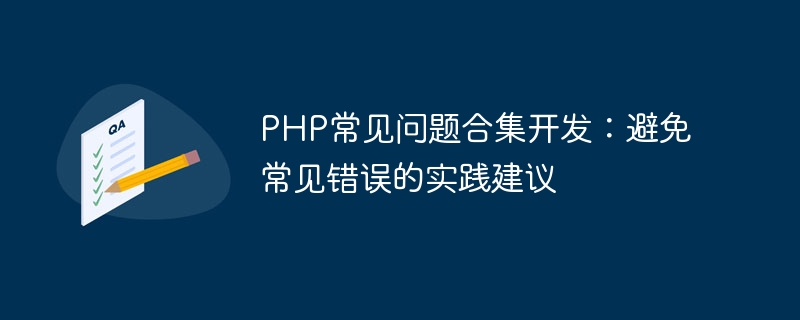

PHP FAQ Collection Development: Practical Suggestions to Avoid Common Mistakes
Introduction:
As a popular server-side scripting language, PHP plays an important role in Web development play an important role. However, due to its flexibility and ease of use, developers often make some common mistakes. This article will sort out common problems in PHP development and provide some suggestions to avoid these mistakes.
1. Code comments
A common problem in PHP development is the lack of code comments. When writing code, it's a good habit to add comments to every function, class, and important block of code. Comments can provide key information, including the function of the code, parameter descriptions, and return values. Proper comments can improve code readability and maintainability.
2. Error handling
In PHP development, error handling is an aspect that is easily overlooked. Developers should learn to use try-catch statements to catch and handle exceptions. When catching exceptions, it is very important to record error logs so that problems can be discovered and solved in time. In addition, do not use error reporting levels that are too permissive and should limit use to development environments to prevent sensitive information from being leaked.
3. Security
Security is another important issue in PHP development. Developers should always be vigilant to avoid common security vulnerabilities such as SQL injection and cross-site scripting attacks. To enhance security, you can use secure database operation APIs to avoid SQL injection while filtering and validating user input. Also, make sure your server has the latest PHP version and security patches installed to protect against known security vulnerabilities.
4. Database Operation
When performing database operations, developers should follow best practices and avoid common mistakes. For example, using prepared statements and bound parameters can prevent SQL injection attacks and improve performance. Also, avoid using SELECT * statements and instead explicitly specify the required columns to reduce the amount of data transferred. Using appropriate indexes can improve query efficiency.
5. Performance Optimization
The performance of PHP code is crucial to the response speed of web applications. Developers should follow some performance optimization suggestions, such as reducing the number of database queries, using cache, and avoiding nested loops. Additionally, you can use performance analysis tools to locate bottlenecks in your code for optimization.
6. Code Reuse
Code reuse is a good way to improve development efficiency. Developers should learn to use functions, classes, and namespaces to encapsulate code so that it can be reused in different projects. At the same time, it is a good practice to follow object-oriented design principles and write reusable code.
7. Error logging and debugging
Error logging and debugging are often required in PHP development. Developers should record error information in a timely manner and conduct reasonable debugging. You can use the logging library to record error information and debugging information, and use debugging tools and breakpoint debugging technology to locate problems in the code.
Conclusion:
Practical suggestions for avoiding common mistakes in PHP development include: code comments, error handling, security, database operations, performance optimization, code reuse, and error logging and debugging. By following these recommendations, developers can improve the quality, readability, and maintainability of their code, thereby better developing efficient, secure, and reliable web applications.
Total: 767 words.
The above is the detailed content of PHP FAQ Collection Development: Practical Suggestions to Avoid Common Mistakes. For more information, please follow other related articles on the PHP Chinese website!